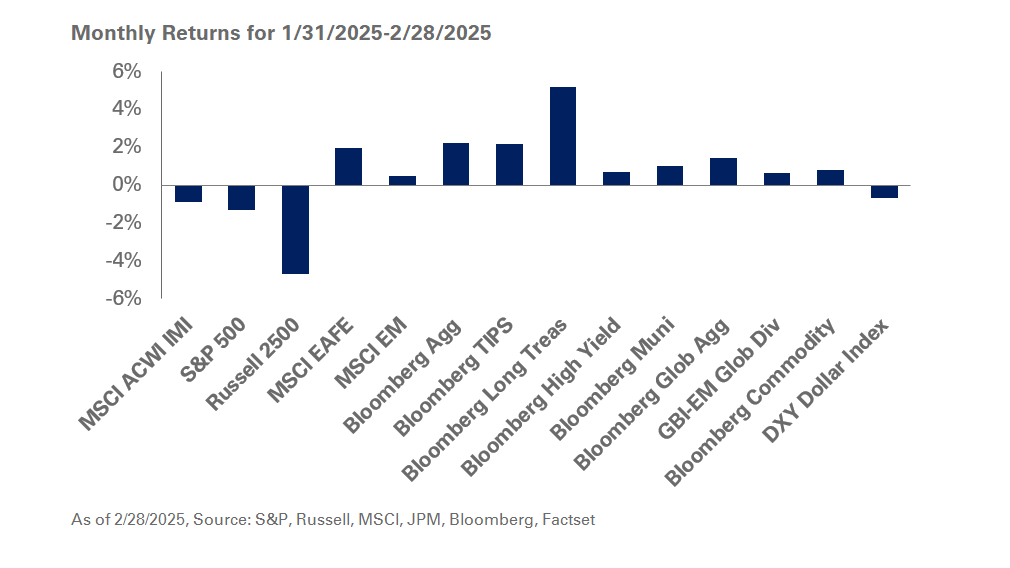The rapid spread of the new coronavirus (COVID-19) has rattled markets as investors struggle to assess the full extent of its economic impact. While its toll over the long term on businesses and economies is yet to be determined, the uncertainty has fueled a repricing of capital assets and fresh concerns around volatility and risk.
Investing against this backdrop can be especially challenging as fear of the unknown can lead to paralysis in the decision-making process. It is in these difficult times we strive to be of the greatest service to our clients. At NEPC, our goal is to not only help steer your portfolio through tumultuous times, but also enable you to take advantage of the investment opportunities that arise from the market turmoil.
To this end, we believe the following three steps will help investors successfully navigate turbulent markets:
- Stay diversified: What a difference a few months can make! In 2019, prudence came under fire. In light of the phenomenal gains posted by equities—the S&P 500 Index was up a whopping 31%—investors with diversified portfolios felt like they left money on the table. In 2020, diversification may very well have the last word as investors realize the benefits of having parts of their portfolio perform when risky assets struggle. As we have seen these past few weeks, markets can whipsaw as they digest new information. During market turmoil, diversification not only helps to cushion returns, but also provides a great source of capital for rebalancing. While equities and other risky assets may begin to appear attractively priced, the discipline of diversification is paramount for investment success over the long term.
- Rebalance towards targets: While we will know where and when the market bottoms out only in retrospect, we do know that equity prices have dropped more than 10% since the beginning of the year. This is not to say that equities are 10% cheaper because the present value of future earnings could have fallen by more. At the same time, other assets in the portfolio, for instance, high-quality bonds are in the black so far this year. This is the beauty of diversification, but that benefit is best realized by rebalancing towards long-term targets and not by leaving a mix of assets to float aimlessly.Indeed, equities may go even lower and there may be further rebalancing opportunities. On the other hand, equity markets may have fully priced in or overreacted to the impact of COVID-19. At the same time, safe-haven fixed income has delivered considerable gains in recent weeks. Rebalancing can serve the dual benefit of buying an asset, equities, which has gone down in price, and selling an asset that has gone up in value as yields on the 10-year Treasury hit a record low of 0.50%. In comparison, the S&P 500 dividend yield is 1.9%, nearly four times greater than the recent lows of the 10-year Treasury yield. Based on these metrics alone, stocks are more cheaply valued relative to bonds than they were a few months ago.The selloff in equities and the surge in demand for safe-haven fixed income have already had a meaningful impact on investment portfolios: A portfolio made up of 60% global equities and 40% US core bonds on January 1 would be closer to a portfolio made up of 55% stocks and 45% bonds based on the recent equity market correction. Rectifying a meaningful deviation from targets is a critical advantage that successful long-term investors employ, as uncomfortable as it may be to execute amid a fear of markets falling further.
- Have a plan of action: Fear and uncertainty will likely govern capital markets in the near term. Today, we view rebalancing as a helpful and necessary action that investors can take. That said, we do not know what the future holds. Government and business initiatives to contain the impact of COVID-19 could prove effective and volatility could subside, but we could also see more meaningful economic disruption and a further repricing in markets if these interventions fall short. If it is the former, markets have probably already overreacted. If it is the latter, markets have not reacted enough and will probably overreach at some point. It is this overreaction that typically gives rise to great investment opportunities, be it in public equities, distressed debt, or any other area of the market. Knowing where these opportunities exist is secondary to having a plan to evaluate and respond to them; planning a potential course of action in a volatile investment environment can allow you to be clear-headed and disciplined when you need to be.
Conclusion
It is often said that diversification is a regret-maximizing approach. There will always be a worst-performing asset in your portfolio that you wish you had sold, just like there will always be the asset you wish you owned more of because its value appreciated the most. That said, it is during periods of market volatility that you realize that staying diversified is worth the regret. To this end, investors seeking long-term success must have the discipline to stay diversified, the courage to rebalance amid turbulence, and the foresight to plan and prepare for uncertainties.
We look forward to working closely with you during these challenging times and will continue to communicate our thoughts and recommendations as the market evolves. Your NEPC consultant will be reaching out to you to ensure we are doing everything we can to support your long-term investment objectives.



